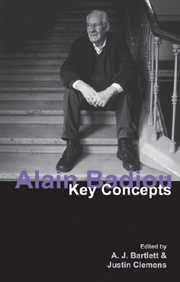Book contents
- Frontmatter
- Contents
- Contributors
- Acknowledgements
- Abbreviations
- Miscellaneous Frontmatter
- Introduction: Badiou's form
- 1 Biography and early works
- PART I THE FOUNDATIONS OF BADIOU'S THOUGHT
- PART II BADIOU'S KEY CONCEPTS OR “CONDITIONS”
- PART III BADIOU'S ENGAGEMENT WITH KEY PHILOSOPHERS
- 10 Plato
- 11 Spinoza
- 12 Kant
- 13 Hegel
- 14 Heidegger
- 15 Lacan
- 16 Deleuze
- 17 New directions
- Afterword: Badiou's futures
- Bibliography
- Index
13 - Hegel
from PART III - BADIOU'S ENGAGEMENT WITH KEY PHILOSOPHERS
- Frontmatter
- Contents
- Contributors
- Acknowledgements
- Abbreviations
- Miscellaneous Frontmatter
- Introduction: Badiou's form
- 1 Biography and early works
- PART I THE FOUNDATIONS OF BADIOU'S THOUGHT
- PART II BADIOU'S KEY CONCEPTS OR “CONDITIONS”
- PART III BADIOU'S ENGAGEMENT WITH KEY PHILOSOPHERS
- 10 Plato
- 11 Spinoza
- 12 Kant
- 13 Hegel
- 14 Heidegger
- 15 Lacan
- 16 Deleuze
- 17 New directions
- Afterword: Badiou's futures
- Bibliography
- Index
Summary
Of all canonical philosophers aside from Plato, Hegel is without a doubt Badiou's most constant interlocutor. “In effect,” he writes, “I think there are only three crucial philosophers: Plato, Descartes and Hegel” (LW 527). At least in his published work, no other philosopher is read with the same fervour as the author of The Science of Logic: “I have never ceased measuring myself up to this book, almost as unreadable as Joyce's Finnegans Wake” (LW 529). Both Being and Event and Logics of Worlds contain important sections devoted to Hegel, and there are a sufficient number of references to Hegel scattered throughout Badiou's recent publication to warrant the claim that he continues to see himself as a dialectical thinker who works in the shadow of Hegel.
In The Century, Badiou argues that the re-evaluation of the dialectic is very much a self-assigned task of the whole twentieth century: “The century is a figure of the nondialectical juxtaposition of the Two and the One. Our question here concerns the century's assessment of dialectical thinking” (TC 59, trans. mod.). Instead of the more familiar schemes for the sublation of contradiction, much of the twentieth century is said to be dominated by what Gilles Deleuze would have described as “disjunctive syntheses”, that is, non-dialectical or even anti-dialectical solutions to the problem of articulating not only the old and the new, the end and the beginning, the instantaneous act and the creative duration, but also truth and semblance, life and the will, historicism and vanguardism.
- Type
- Chapter
- Information
- Alain BadiouKey Concepts, pp. 137 - 145Publisher: Acumen PublishingPrint publication year: 2010
- 12
- Cited by

